Hydra Greek Monster: Fearsome Multi-Headed Dragon That Inhabited Swamps Of Lerna
A. Sutherland - AncientPages.com - In Greek mythology, strange, mythological creatures played a leading role in the stories of heroes and gods. These creatures have both an unusual or terrifying appearance and supernatural powers.
 The Lernaean Hydra. Attic amphorae from the 5th century BC. source
The Lernaean Hydra. Attic amphorae from the 5th century BC. source
One of them was the Hydra of Lerna, also known as the Lernaean Hydra, a multi-headed reptilian child of Echidna, the nymph, and the monster Typhoon. It symbolizes the difficulties in the fight against evil: a new one immediately grows when one of her heads is cut off.
In Greek and Roman mythology, the Hydra ("water snake") dwelled in the marshes near the Lake of Lerna, a bottomless lake connected to the Underworld, sometimes known as Hades. Hydra was a guardian of one of the entrances to Tartarus and the sibling of Cerberus, the goat/lion/serpent Chimaera, the two-headed hound Orthos, the Sphinx, the Nemean Lion, and the Krommyonian Sow.
She was a terrifying monster who poisoned enemies with her breath and blood. She possessed many heads, but their exact number varies, depending on the version of the myth.
Seven Or Nine Heads And The Ability To Regenerate
Hydra is often described and depicted as having seven or nine heads, the middle of which was immortal. In later versions of the Hydra myth, the monster possessed the ability to regenerate, and for every head chopped off, it could quickly regrow two heads.
Occasionally, depictions show her with dragon claws and a torso covered with hard scales, wings, or feet, while the body resembles a gigantic dog.
Hydra's breath was so poisonous it could kill any man who breathed it, and blood was toxic and capable of killing a man instantly.
Slaying The Multi-Headed Hydra
Hydra was defeated by Hercules (Heracles), a divine hero in Greek mythology, the son of Zeus and Alcmene, in the second of his twelve labors.
Hercules and the Hydra. John Singer Sargent, Museum of Fine Arts, Boston
Upon reaching the lake where the monster lived, Heracles fired his arrows so Hydra would come out of its depths and fight with him. Heracles cut off one of his heads with his sword, but a new head emerged from his body.
Scorpions and snakes appeared from the blood that the monster shed on the ground. To continue with his dangerous task, Heracles asked the assistance of his nephew Iolaus to cut off all of the monster's heads, along with the creature's immortal head of gold) and burn the neck using a sword and fire.
Finally, the fearsome and hideous creature that terrorized both people kidnapped cattle, and devastated fields, was defeated once and for all.
Heracles buried the immortal head of the Hydra under a large boulder; thus, his second labor was completed.
Legend Of Water Monster – The African Hydra
According to another myth, the water snake, known as the African Hydra, had seven heads and the ability to control the water level in the river, which was her home.
The people made offerings to the creature to ensure the river's flow. One legend says that a couple decided to offer their daughter, Jinde, as a wife to the Hydra in return for a constant water supply. The girl begged the creature to let her return home to visit her parents; the Hydra agreed but swore if she did not return after one day, it would come after her.
For fear of the monster, Jinde's parents refused to help her escape from the Hydra, so the girl sought the assistance of her boyfriend. When Jinde did not return, the Hydra left her realm to retrieve his bride. Instead of the girl, the Hydra met Jinde's lover, who fought the monster and was able to decapitate each of its seven heads.
Hydra Symbolizes Difficulties And Obstacles
Many believe that the Hydra of Lerna is more than only one of the many fascinating monsters in the colorful Greek myths and legends.
The creature symbolizes difficulties and obstacles that multiply while accomplishing a task. Some others believe that the story of the Hydra of Lerna refers to the problems the region's inhabitants suffered when they drained a marsh to reclaim their land for their own protection.
Sometimes various problems appear over and over again, constantly tormenting our lives.
Updated on March 1, 2023
Written by - A. Sutherland - AncientPages.com Senior Staff Writer
Copyright © AncientPages.com All rights reserved. This material may not be published, broadcast, rewritten or redistributed in whole or part without the express written permission of AncientPages.com
Expand for referencesReferences:
Routledge, Handbook of Greek Mythology
Clevenger S. Greek Mythic History
Goldstein J. 101 Amazing Mythical Beasts
Bane T. Encyclopedia of Beasts and Monsters in Myth, Legend, and Folklore
More From Ancient Pages
-
 Legend Of The Loretto Chapel Staircase – Unusual Helix-Shaped Spiral Construction
Featured Stories | Nov 1, 2018
Legend Of The Loretto Chapel Staircase – Unusual Helix-Shaped Spiral Construction
Featured Stories | Nov 1, 2018 -
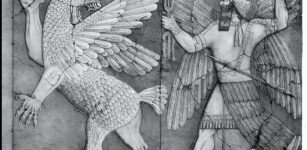 Evil God-Bird Anzu Who Stole The Tablet Of Destiny To Control Universe and Fates Of All
Featured Stories | Aug 8, 2016
Evil God-Bird Anzu Who Stole The Tablet Of Destiny To Control Universe and Fates Of All
Featured Stories | Aug 8, 2016 -
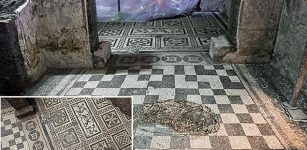 Ancient Roman ‘Commander House’ Discovered In Rome
Archaeology | Mar 5, 2018
Ancient Roman ‘Commander House’ Discovered In Rome
Archaeology | Mar 5, 2018 -
 Archaeology Illuminates Chinese Businesses In Eugene
Archaeology | May 23, 2022
Archaeology Illuminates Chinese Businesses In Eugene
Archaeology | May 23, 2022 -
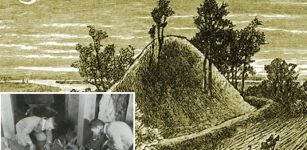 Spearhead Mound – Destroyed Burial Place Of Adena Giants?
Featured Stories | Jun 1, 2021
Spearhead Mound – Destroyed Burial Place Of Adena Giants?
Featured Stories | Jun 1, 2021 -
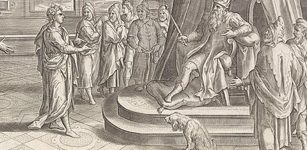 Nebuchadnezzar II – Greatest Ruler Of Ancient Babylonia And Conqueror Of Judah
Featured Stories | Jan 28, 2019
Nebuchadnezzar II – Greatest Ruler Of Ancient Babylonia And Conqueror Of Judah
Featured Stories | Jan 28, 2019 -
 ‘Flower Burial’ And Shanidar Cave With Neanderthal Remains Who Lived 70,000 Years Ago
Archaeology | Feb 19, 2020
‘Flower Burial’ And Shanidar Cave With Neanderthal Remains Who Lived 70,000 Years Ago
Archaeology | Feb 19, 2020 -
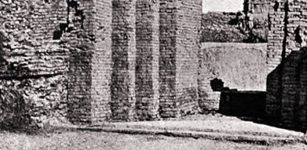 Sumerian City Of Girsu: Political, Religious Center With Large Archive Of Thousands Of Cuneiform Tablets
Civilizations | Jul 21, 2023
Sumerian City Of Girsu: Political, Religious Center With Large Archive Of Thousands Of Cuneiform Tablets
Civilizations | Jul 21, 2023 -
 Rare Pre-Columbian Archaic Settlement Discovered In The Dominican Republic May Solve A Caribbean Mystery
Archaeology | Apr 12, 2022
Rare Pre-Columbian Archaic Settlement Discovered In The Dominican Republic May Solve A Caribbean Mystery
Archaeology | Apr 12, 2022 -
 On This Day In History: Great Sheffield Flood – Largest Man-Made Disaster Occurred In England – On Mar 11, 1864
News | Mar 11, 2017
On This Day In History: Great Sheffield Flood – Largest Man-Made Disaster Occurred In England – On Mar 11, 1864
News | Mar 11, 2017 -
 Ivar The Boneless: Famous Viking And Son Of Ragnar Lodbrok
Featured Stories | Jun 6, 2016
Ivar The Boneless: Famous Viking And Son Of Ragnar Lodbrok
Featured Stories | Jun 6, 2016 -
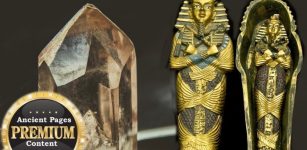 Lost Knowledge Of Energy And Crystal Technology In Ancient Egypt
Ancient Technology | May 17, 2019
Lost Knowledge Of Energy And Crystal Technology In Ancient Egypt
Ancient Technology | May 17, 2019 -
 Ancient Ziggurat Of Aqar Quf Dedicated To God Enlil
Civilizations | May 3, 2019
Ancient Ziggurat Of Aqar Quf Dedicated To God Enlil
Civilizations | May 3, 2019 -
 Challenging Prehistoric Gender Roles – Women Were Hunters Too – Not Just Men
Archaeology | Oct 21, 2023
Challenging Prehistoric Gender Roles – Women Were Hunters Too – Not Just Men
Archaeology | Oct 21, 2023 -
 Spectacular Square-Headed Creature And 143 New Nazca Geoglyphs – Discovered
Archaeology | Nov 19, 2019
Spectacular Square-Headed Creature And 143 New Nazca Geoglyphs – Discovered
Archaeology | Nov 19, 2019 -
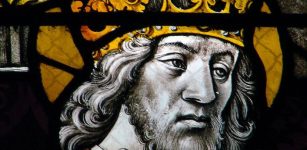 On This Day In History: Charlemagne King Of The Franks And Emperor Of The Holy Roman Empire Born – On April 2, 742
News | Apr 2, 2017
On This Day In History: Charlemagne King Of The Franks And Emperor Of The Holy Roman Empire Born – On April 2, 742
News | Apr 2, 2017 -
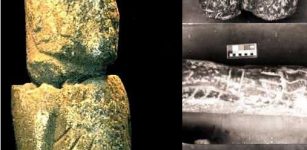 Inscription On Pokotia Monolith Reveals Sumerians Visited Peru Thousands Of Years Ago
Ancient Symbols | Sep 1, 2015
Inscription On Pokotia Monolith Reveals Sumerians Visited Peru Thousands Of Years Ago
Ancient Symbols | Sep 1, 2015 -
 Master Kong Confucius: Great Philosopher And ‘Teacher Of All Teachers’ Ahead Of His Time
Featured Stories | Nov 25, 2016
Master Kong Confucius: Great Philosopher And ‘Teacher Of All Teachers’ Ahead Of His Time
Featured Stories | Nov 25, 2016 -
 Mystery Of The Lost Continent Destroyed By An Ancient Cataclysm – Mysterious Islands – Part 2
Featured Stories | Aug 16, 2021
Mystery Of The Lost Continent Destroyed By An Ancient Cataclysm – Mysterious Islands – Part 2
Featured Stories | Aug 16, 2021 -
 Secret History Of The Micmac – The Mysterious Red Earth People
Civilizations | Jun 22, 2020
Secret History Of The Micmac – The Mysterious Red Earth People
Civilizations | Jun 22, 2020

